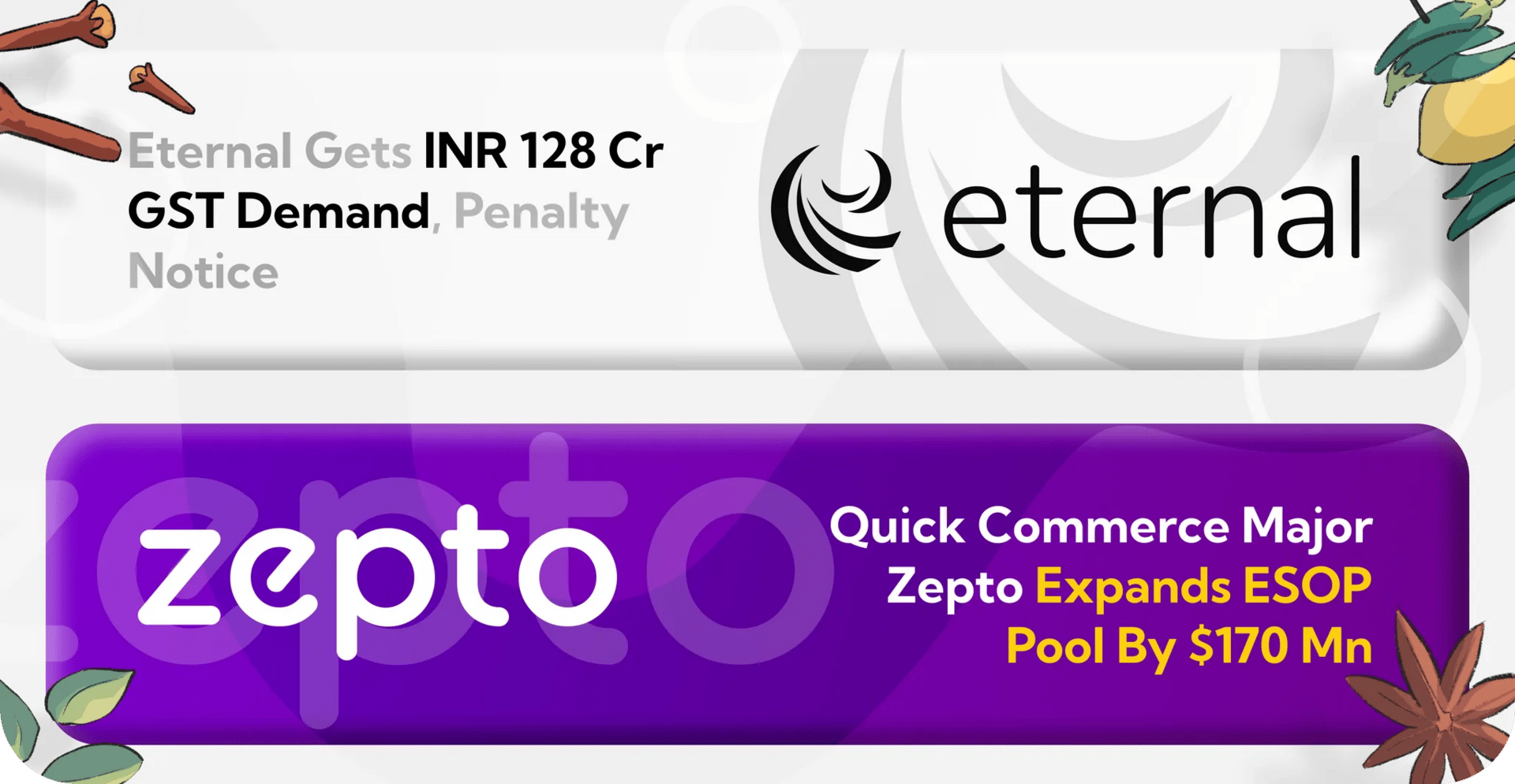- Startup Chai
- Posts
- India’s Deep-Tech Brain Drain, Eternal Gets Notice, and MeitY Fights AI Trickery
India’s Deep-Tech Brain Drain, Eternal Gets Notice, and MeitY Fights AI Trickery
Plus Zepto Expands ESOP Pool, and fundraising news about UnifyApps and India Quotient

India’s deep-tech dream is finally starting to look real - but it’s also painfully fragile. Startups like Silizium Circuits, which designed India’s first homegrown 5G Low-Noise Amplifier chip, show what’s possible when government grants, IIT partnerships, and startup grit come together. The chip works across 5G, SATCOM, and NavIC applications - technology that directly supports both defense and telecom needs. But there’s a catch: Silizium still had to send its design abroad for fabrication because India lacks large-scale semiconductor manufacturing. We have brilliant designers but no fabs, and that imbalance is India’s biggest weak spot.
The other big issue is talent. India has about 20% of the world’s chip design engineers but less than 1% of its fabrication capacity, and that’s creating a talent tug-of-war. Global Capability Centers (GCCs) - think Samsung, ARM, Qualcomm, Google - are aggressively hiring India’s best deep-tech engineers, offering salaries 50-100% higher than local startups can match. Some senior AI and chip-design roles already fetch ₹1.5-2.2 crore a year in GCCs. For a startup running on a ₹10 crore annual budget, losing even one key engineer can set them back by months. Firms like EvoluteIQ, which raised $53 million to expand AI R&D in Bengaluru, are pulling the same limited pool of engineers that chip startups need.
Government support is strong on paper. The India Semiconductor Mission (₹76,000 crore) and the Design Linked Incentive scheme have already sanctioned over 23 design projects and backed companies like Mindgrove, Netrasemi, and AuraSemi. Tata and Micron are setting up fabrication and assembly units in Dholera and Sanand, with investments topping ₹1.6 lakh crore. But it’ll take years before chips are manufactured at scale. Meanwhile, deep-tech startups spend their limited capital trying to retain talent, not build capacity.
India’s best hope lies in focusing on niche IP and anchor markets. Companies like Mindgrove (secure RISC-V IoT chips, 30% cheaper than imports) and Netrasemi (edge-AI chips for smart cameras) are proving that small, sharp teams can build globally relevant tech. This is India’s chance to become a design superpower, much like how Taiwan mastered chip packaging and Korea dominated displays. But to stay competitive, India needs a Talent-Linked Incentive (TLI), subsidies that bridge the salary gap for 20-30 critical deep-tech roles per startup, and public procurement that mandates government and defense buyers to use Indian chips.
Globally, the contrast is stark. The US CHIPS Act pours billions into fabs and talent; China’s “Big Fund” built an entire supply chain, though not without corruption scandals. India’s version is still cautious and bureaucratic - lots of ambition, limited speed. The good news: deep-tech funding in India jumped 78% YoY in 2024 to reach $1.3 billion, and the AI market is expected to hit $17 billion by 2027. The bad news: unless engineers see long-term stability here, many will keep choosing higher-paying global roles over patriotic pay cuts.
If India wants to win this deep-tech decade, it needs to buy time - literally. That means paying engineers to stay, fast-tracking fab construction, and using state procurement as an anchor. Our real competition isn’t just OpenAI or TSMC - it’s time, talent, and retention. The clock is ticking, and every Friday, another top engineer walks out the door.
Let’s go through what else is happening in Indian startup world - Grab your simmering cup of StartupChai.in and unwind with our hand-brewed memes.

“Blunder Ho Gayil Ba”: Eternal Gets INR 128 Cr GST Demand, Penalty Notice
Zomato’s parent company, Eternal, has received a GST demand and penalty notice amounting to INR 128 Cr from Uttar Pradesh authorities.
The order alleges short payment of output tax and excess claims of input tax credit. Eternal has stated that it will contest the order, maintaining that it has a strong case and will appeal before the appropriate authority.
Read more here

“Ab Tumhari Khair Nahi”: MeitY Proposes New IT Rules To Tackle Social Media Deepfake Abuse
The government’s tech arm, MeitY, is tightening the reins on AI trickery with proposed amendments to the IT Rules, 2021.
The move would require platforms like X, YouTube, and Instagram to clearly label all deepfakes and AI-generated posts as “synthetically generated information.” The idea is simple yet urgent - keep the internet real, even when the pixels lie.
Read more here


“Kaddu Katega, Sab Mein Batega”: Quick Commerce Major Zepto Expands ESOP Pool By $170 Mn
Zepto is sweetening the deal for its team, expanding its ESOP pool by a whopping $170 Mn to cross the $500 Mn mark.
The quick commerce player has added another 39.4 Lakh stock options, now totaling about 1.23 Cr. Fresh off its $450 Mn funding round led by CalPERS, Zepto seems keen to keep its fastest movers truly invested.
Read more here
“Hum Saath Saath Hai”: Atlys partners with Jar to offer digital gold referral rewards
Visa platform Atlys has partnered with gold technology company Jar to introduce a referral programme that rewards users in digital gold.
Verified customers who refer new users to Atlys will receive gold worth Rs 500 to Rs 5,000 once the visa process is completed and paid for. The initiative will run on a first-come, first-served basis until one kilogram of gold has been distributed.
Read more here

UnifyApps has secured $50 Mn in a round led by WestBridge Capital, with support from ICONIQ and others. The startup plans to use the funds to expand its team and strengthen its AI tech stack, marking a total raise of $81 Mn so far.
Read more here
India Quotient has closed its fifth fund at $129 Mn, aimed at backing pre-seed to seed stage Indian startups, including those at the idea stage. The VC firm has also onboarded Sahil Makkar and Kanika Agarrwal as partners to steer its next decade of early-stage bets.
Read more here
How did today's serving of StartupChai fare on your taste buds? |